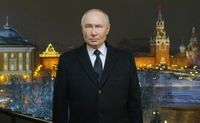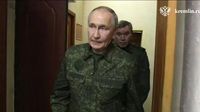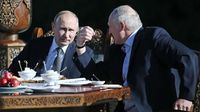Worries over the stability of peace in Europe are escalating as military experts voice severe concerns regarding potential Russian aggression, particularly directed towards NATO countries. In the wake of ongoing military operations in Ukraine and anticipated military maneuvers, experts suggest that an autumn offensive might be on the horizon.
Military historian Prof. Sönke Neitzel has capped concerns with a chilling statement: "This could be our last summer in peace." In an interview with the German newspaper Bild, Neitzel expressed trepidation over deteriorating geopolitical conditions, underscored by Russia's plans for extensive military exercises known as the "Sapad" maneuver in Belarus later this year.
On March 22, 2025, Neitzel pointed out that discussions of a possible escalation are not merely speculation. He asserts that the potential for a serious attack from Russia exists, fueled in part by perceptions in Moscow that NATO's deterrent capabilities have diminished. "We must be capable," Neitzel stressed, underscoring the importance of readiness in the face of emerging threats.
These sentiments are echoed by BND chief Bruno Kahl, who has warned that Russia aims to test the unity of the West. He notes that the outcomes of the ongoing conflict in Ukraine greatly influence Russia's likelihood of proceeding with aggressive maneuvers against NATO allies. Kahl aptly summarized this concern, predicting that "the early resolution of the conflict in Ukraine could empower Russia to engage Europe directly."
The stakes are high, particularly for the Baltic states, which are understandably apprehensive about being on the frontlines of any potential Russian aggression. Experts indicate that the planned "Sapad" maneuvers could serve as a prelude to an on-ground assault. Sabine Adler, a Russia expert, emphasized during a recent appearance, "There is real war danger already in autumn." She cautioned against dismissing these military exercises as mere displays of force, illuminating their capacity as precursors to significant military operations.
Neitzel and Adler's perspectives converge on the notion that these military drills are not only about preparation but are also strategic provocations. Specifically, Adler directs attention to the Suwalki corridor, a narrow stretch of land linking Lithuania to Poland, as a focal point of tension that could ease Russian access to Belarus, amplifying the threat level in Eastern Europe.
In contrast to these dire warnings, philosopher Richard David Precht remains skeptical of the prevailing narratives surrounding Russian aggression. During a podcast with Markus Lanz, Precht labeled the fears of an imminent invasion of NATO states as a "fairy tale." He remarked, "After the Russians' experiences in Ukraine, they are unlikely to provoke NATO. This perception of an immediate threat seems exaggerated to me." Precht advocates for peace talks rather than militaristic responses, suggesting that dialogue should supersede fears of war.
Despite the contrasting views, Precht's comments have faced scrutiny given the historical context of Russia's actions following previous military exercises. Observers recall the military build-up preceding Russia's invasion of Ukraine, igniting fears that similar strategies could be employed against NATO nations. As the geopolitical climate grows increasingly fraught, the implications of inaction or miscalculation during these military preparations could have catastrophic consequences.
It is evident that there is a significant divergence in perceptions regarding the threat posed by Russia, and this divergence necessitates critical discourse surrounding security in Europe. Neitzel has highlighted that NATO's response will play a crucial role in determining the prospects for peace. He noted that decisions made in the coming months could shape the future security landscape of Europe.
As European nations grapple with military readiness against a potential Russian offensive, the chorus of experts continues to sound alarms. With the stakes so high, it remains paramount for the NATO alliance to bolster defenses and prepare for any eventualities. Failure to respond proactively may lead Europe into a new chapter of conflict, contrasting sharply with the hopeful desire for lasting peace.
In conclusion, the unfolding situation underscores the necessity for strategic foresight and enhanced unity among NATO members. As 2025 progresses, the potential for escalating tensions demands vigilant monitoring and collective action, ensuring that the dreams of peace do not succumb to the specters of war.




